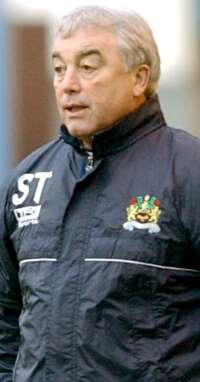Steve Cotterill will, no doubt, be delighted to have achieved that victory at 
It is probably a telling fact that, with only two goals to date, less than this time last year, we have four more points on the board than a year ago. It is the one in the ‘against’ column, contrasted with a staggering nine a year ago, which is the fundamental difference.
All in all, it represents a promising start to the Cotterill era. The new look defence is clearly bedding in nicely, and there have even been unconfirmed reports of Mo Camara defending properly. There is a new resilience about this
It is typical of the fickle world of football that, but for this testimonial, Stan Ternent’s name would barely raise a mention amongst
Cotterill remains in the stage of his Turf Moor career which tends to be known as the Honeymoon period. He can do no wrong, every decision he makes comes good – and long may it continue. As so often follows a regime change,
there is a feel-good factor around Turf Moor which will probably see its stands filling up for Saturday’s visit of Wolverhampton Wanderers. Handily, this bonus income may find its way into Steve Cotterill’s budget, and in turn, could result in a couple more entries in the squad column on the back page of the programme. In such ways are upward spirals begun.
Stan did the same once, except that it says more about the latter years of his reign than many of the litany of epilogues to have been written thus far that Cotterill had a firmer base from which to launch that upward curve. Ternent had to tough it out and do the hard yards before he was able to create that air of buoyancy that ultimately bought him close to his ultimate goal of Premiership football.
With old and new being brought so starkly alongside each other tonight, there is a last comparison to be made between the two men. Not concerning who is the right man to lead
Unquestionably, Steve is a new manager from the modern breed of head-coaches, in the mould of Moyes or Dowie or McClaren. This is a generation of thinkers who believe in the value of science. Their approach involves yoga, masseurs and psycho-analysts, new and innovative techniques which are supposed to advance professionalism within the game. 
That is not Stan’s era, but then, the likes of Sir Bobby and Sir Alex – who remain the highest placed British managers in domestic football – are living proof that the old approaches can still be successful.
Yet the basic traits of all these men are the same. All are deeply determined, driven men. Steve Cotterill’s alleged lack of loyalty was fuelled by an ambition to manage in the Premier League – something openly maintained by Ternent. Both men characteristically give nothing away to the public. Team bonding is a mutual priority.
Even their approach to team-building is similar. The hall-mark of Stan’s teams when he had a free rein at
And interestingly, both seem to take the same approach to the youthful talent around at Gawthorpe. It is becoming increasingly familiar to see the Clarets make use of just one substitute – Lee Roche. For all the suggestion of a change of emphasis at the club, and a new willingness to give youth its head, the bench has featured only players who were given their debut by Ternent – and then only in a passive role. It all suggests that both managers agree that the lads are not yet good enough – if they ever will be.
Of course, they have a different style. Cotterill courts the press more, and thinks carefully about the effect of what he says – in contrast to the more confrontational, take-me-as-I-am attitude of Ternent. He clearly coaches in a different way. Yet these are differences of style and emphasis rather of fundamental basics.
It is probably the minutiae that distinguishes success and failure in a career, or even within a particular job. But interestingly, when a manager first arrives, even the things seen as faults in his predecessor can be perceived in a positive light.
When Steve leads his
And yes, that was Steve. Times really are a-changing.
